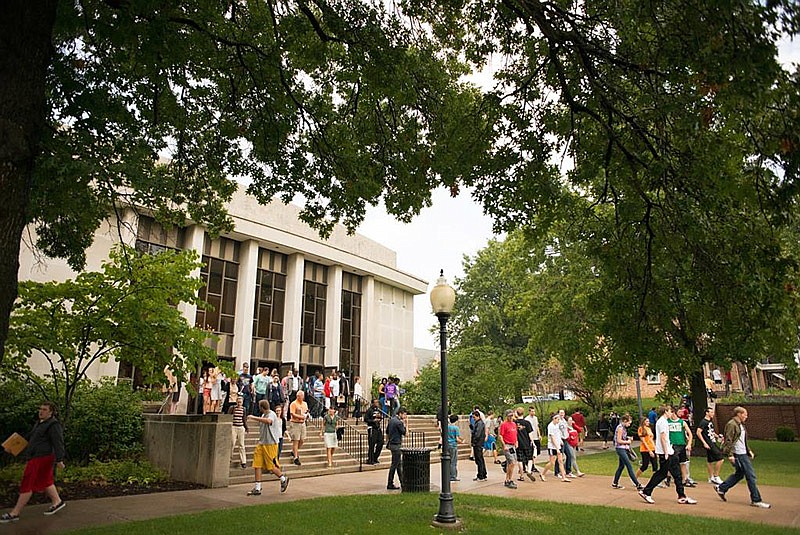In a few weeks, the Hancock Symposium at Westminster College will bring some of the best brains in the world to Fulton.
The thought-provoking, two-day seminar is meant to get all people in the community thinking and talking about important issues, according to coordinator Kurt Jefferson, assistant dean for Global Initiatives.
"This is, really, Westminster's gift to the community," he said. "Having a college in a small town like this - this provides cultural opportunities, cultural advancement."
This year's Hancock Symposium, "Audacious Ingenuity: Pushing the Boundaries of Science," will be Sept. 14-15. The events are all free and open to the public, as well as drawing in the college's 1,000 students, staff and alumni.
"Eleven years ago in 2006, we started the Hancock Symposium," Jefferson said. "At the time it was called the Symposium on Democracy, and it was envisioned to touch on different facets of the term democracy."
However broad that term was, symposium organizers wanted an even broader scope, and so it became the Hancock Symposium.
The symposium is named for David and Linda Hancock. David Hancock, a 1967 Westminster College graduate, is a businessman in Kansas City. About three years ago, the couple made a gift to finance the symposium for generations of students, Jefferson said.
"They've made it possible for us to have a wonderful event, and now we've named it after him and Linda," Jefferson said.
The purpose of the event is to present important issues in a way that makes sense to students, their teachers and the Fulton area community at large.
"The idea originally was to challenge and track global issues as a community and bring in speakers who could challenge us to think critically about issues today," Jefferson said. "Students, staff and faculty, alumni and the community can sit down and have a discussion about these topics."
Jefferson said while some schools have similar, smaller events, he thinks Westminster's symposium is unique.
"This is being informative on a level the layperson can understand," he added. "Everybody breaks into sessions and it's neat, because it's like having a class with 1,000 people. That's virtually something no one does."
In the past, notable speakers have included Gen. David Petraeus, former Iraq War general and director of Central Intelligence; environmentalist Robert F. Kennedy Jr.; humanitarian Sir Bob Geldof; and baseball player Roberto Clemente Jr.
The symposium will end with the 57th Green Foundation Lecture, which predates the symposium by decades.
"(Winston) Churchill gave the lecture in 1947," Jefferson said.
This year, the 57th Green Foundation Lecture will be given by Dr. Bennet Omalu, a pioneer in the study and diagnosis of chronic traumatic encephalopathy. In 2002, he discovered the presence of a degenerative disease in the brain of former professional football player Mike Webster. His efforts to raise awareness of CTE were rebuffed by the National Football League, though mounting evidence eventually forced the league to make concessions. Omalu's work was dramatized in the 2015 film "Concussion," with Will Smith portraying the Nigerian-born doctor.
"Omalu's work is very high profile and has been, in some quarters, controversial because of the money being made," Jefferson said. "He's affected how a whole generation of people in the high school and college levels play. This is a big speech; this will be a nationally received speech."
He is a forensic pathologist, professor, medical examiner and founder of the Bennet Omalu Foundation. His talk will be in Champ Auditorium at 1 p.m. Sept. 15.
"We're pretty excited about it," Jefferson said of Omalu's appearance and the symposium in general. "This can spur conversations throughout the rest of the year."
Additional speakers include Dr. Norman Lederman, distinguished professor and chair of mathematics and science education at Illinois Institute of Technology, who will talk at 10:30 a.m. Sept. 14 in Champ Auditorium. His lecture is titled "The Ends May Justify the Means, but the Means Should Never Become the Ends."
In his presentation, Lederman will speak to the equal importance of scientific knowledge, scientific investigation and practices and understanding scientific inquiry and the nature of science.
Lederman has taught a full range of graduate courses in secondary science education and is internationally known for his research on the development of students' and teachers' conception of the nature of science and scientific inquiry. He has served as president of the National Association of Research in Science Teaching and the Association for the Education of Teachers in Science.
Dr. Bina Vanmali, director of the Arizona Science Education Collaborative at Arizona State University, will also speak at the symposium on "Biology and Science Education for Secondary Students Today." This will be a breakout session at 10:30 a.m. Sept. 15 in Room 207 of the Coulter Science Center, where Vanmali will discuss increasing scientific literacy within the classroom.
A third speaker on the topic of science education is Michael Szydlowski, who is the current president for the Science Teachers of Missouri and K-12 science coordinator for Columbia Public Schools. He will be speaking on "Making Science Education Popular with Youth" at 10:30 a.m. Sept. 15 in Room 138 of the Coulter Science Center where he'll discuss what is changing in science education, how to keep students engaged in science education and why all students should be fluent in science understanding.
The symposium also will be attended by local high school students and others from St. Louis and Columbia, Jefferson added.
A complete agenda for the Hancock Symposium can be found at symposium.westminster-mo.edu/. A number of the lectures will be live streamed at www.westminster-mo.edu/go/live.

